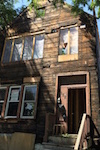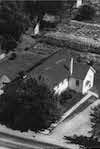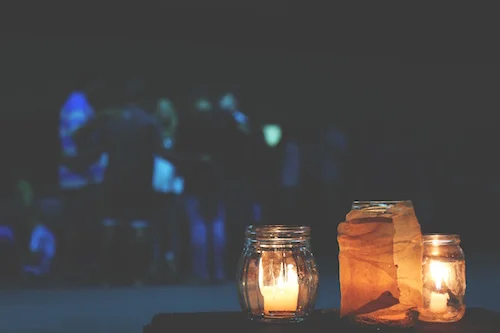I need to enumerate the good things in my life. I need to lift my camera to my face in order to see the gratitude. I need to write about it every day and share it with whoever will listen. I need to look around and pay attention. I need to say thank you to my Creator, on good days and bad.
All in Truth
Holy Island in Loch Derg
This very witness of love intertwines and melds with the aesthetical gift of Inis Cealtra: indeed, the beauty of these ruins forms their ecclesiastical lessons. The stones attest to the labor and handiwork of disciples long ago; arches and elegant stonework attest to the creativity of worship; moss, ivy, and grass attest to the wild edge of praise. These ruins teach us through their longevity, beauty, wildness, openness, emptiness, quietness. They teach us something about the heart of the Church—it is long-lasting, shared, and beautiful.
Stalled by Grace
My dear Britney, I felt, take note of this: You should be quick to listen, slow to speak and slow to become angry. Not simply because it will end in less frustration and hurt feelings, but because it is how we are surprised by life, and grace, and God.
Bright Road
The best artists don’t do all the work. They drop the bread crumbs that lead down the path of discovery. Every day, we’re given glimpses of eternity if we’ll only be willing to look beyond our circumstances and to see with eyes of faith. As C.S. Lewis wrote, “The first demand any work of art makes upon us is surrender. Look. Listen. Receive. Get yourself out of the way.”
Small Things, Slow Work
To love our city and care about the arts and creativity has been about loving and caring for individual people. And I think for any of us it comes down to that. Loving a city and its people in general doesn’t mean a whole lot. Loving a city and its people in specific, however our callings lead us, means everything.
You Are Here to Kneel
I decided that I was the wrong kind of person to visit a monastic order. I was too uncivilized and unlearned, too ornery and idealistic, and maybe even too Protestant. But during our final breakfast with Father Donovan, I scooped jewel-red currant jam I’d helped prepare onto homemade Irish bread and listened to the monk discuss theology, politics, and the proper method of a coffee press. I began to wonder if maybe I'm exactly the right sort after all.
Tell Me a Story
We can never overestimate the value of listening to someone’s story, for it takes great courage to share a hurt or even a joy with another person. The fear of rejection, misunderstanding, or criticism often keeps us from telling someone what has made us who we are. But when another person takes the time to sit with us and listen to what we have lived, our hearts grow stronger.
On Honest Art
For a day we considered our deepest disposition, sons of Adam and daughters of Eve that we are: we compartmentalize, we believe one thing to be true and behave as if another thing is true, we say “This matters most!” and then live as if it doesn’t really. This tendency has profound implications, for learning, for labor, for love, for liturgy—for all of who we are, for all of how we live.
How do we begin to find our way to coherence? Can we even imagine a way of seeing and hearing that honestly connects what we believe with the way that we live?
True-ing
I am no carpenter. But my doctor son, with a degree in tropical medicine, volunteers for a humanitarian agency in Burma, exercising his skills with bodies and souls. He is also a poet and artist. His hobby, and a way of calming his mind and expressing his sense of shape and beauty in the midst of suffering and destitution, is to find odd pieces of wood and fashion from them objects beautiful or useful, exposing the wood's inherent quality. Tables, chairs, bowls, spoons! He’s skilled with a scalpel, either on human bodies or on the striated muscles of something that used to be a tree.
Without knowing it, he has given me a metaphor to live by—the sizing up of my trajectory in life.
 I will grow in the waiting and be stretched in the loving, and I will be there to smile and wave every time she emerges from this process of becoming. I will choose to bend towards trusting a God who is big enough to hold us both. Heart of my heart, flesh of my flesh, Grace will explore this world in her own way, just like I continue to do.
I will grow in the waiting and be stretched in the loving, and I will be there to smile and wave every time she emerges from this process of becoming. I will choose to bend towards trusting a God who is big enough to hold us both. Heart of my heart, flesh of my flesh, Grace will explore this world in her own way, just like I continue to do.
 Sometimes I wonder if the distractions protect us.
Sometimes I wonder if the distractions protect us.
We try to prepare ourselves for life’s inevitable. Recently, an unusual number of patients died. Others are at end stages of life. Coping with the losses holds a unique challenge as we find little opportunity to grieve. Instead, we push through to care for the living patients before us.
Spaces for Hope in the Margins
I cannot make my neighbors less fearful, uncertain, or afraid. I cannot change the world or stop the violence. I can, however, in my little place on the margin of life, faithfully seek to live, think, and speak hopefully. Perhaps it will be a spark that will spread more widely and do some good—after all, hope is life-giving, generative. Perhaps not, but that is not my concern. My concern is to make culture faithfully, culture that will encourage people to flourish in this broken world. And being hopeful is culture making because creativity and art and flourishing is impossible without hope.
 From the day we moved to this old farmhouse called Maplehurst, I kept my eye on the open lawn directly across from the front door. I never looked at the grass and weeds there without seeing them superimposed with roses and daisies. But the gap between vision and reality is enormous. There is a wasteland between the two, and while we are in it we struggle to continue seeing the dream that led us there.
From the day we moved to this old farmhouse called Maplehurst, I kept my eye on the open lawn directly across from the front door. I never looked at the grass and weeds there without seeing them superimposed with roses and daisies. But the gap between vision and reality is enormous. There is a wasteland between the two, and while we are in it we struggle to continue seeing the dream that led us there.
 The structure underneath—the bones of the house—are good because someone we trust knows they’re good, sturdy, strong and able to be restored, and they can tell us this and we believe them. And maybe that’s what we’re after all along—someone who comes along to tell us that there is treasure here in our bones, someone who can see the intrinsic value in what others might consider a teardown.
The structure underneath—the bones of the house—are good because someone we trust knows they’re good, sturdy, strong and able to be restored, and they can tell us this and we believe them. And maybe that’s what we’re after all along—someone who comes along to tell us that there is treasure here in our bones, someone who can see the intrinsic value in what others might consider a teardown.
 I don't notice the robin making her nest. Neither do I notice when she lays her eggs. I don't know how long she bides her time there, waiting for their hatching. After two weeks of rain, the kids and I come outside, squint in the sun, and find four tiny beaks stretching up from a nest on our meter box. The mama robin swoops in, drops in her food, and then flies to a nearby branch to keep watch. We are mesmerized.
I don't notice the robin making her nest. Neither do I notice when she lays her eggs. I don't know how long she bides her time there, waiting for their hatching. After two weeks of rain, the kids and I come outside, squint in the sun, and find four tiny beaks stretching up from a nest on our meter box. The mama robin swoops in, drops in her food, and then flies to a nearby branch to keep watch. We are mesmerized.
 No matter where his pastoral vocation called him—country, city, suburb—Dad found a large vacant lot of lawn or weeds to plow under and plant in long straight rows, ordered in relation to the sun (the corn stalks must not overshadow the tomatoes) and surrounded by winter-squash vines prone to wander outside the frame.
No matter where his pastoral vocation called him—country, city, suburb—Dad found a large vacant lot of lawn or weeds to plow under and plant in long straight rows, ordered in relation to the sun (the corn stalks must not overshadow the tomatoes) and surrounded by winter-squash vines prone to wander outside the frame.
It was not Eden, except in his view.
 A labyrinth is not like a maze, whose purpose is to thwart the walker’s cunning, lose her in a splatter of dead ends, spin him back to the beginning before earning a finish. A labyrinth is a disappointment for a person hoping for such a puzzle. No challenge, no tense thrill. Just one foot in front of the other like any other day. One path takes you to the labyrinth’s center and the same path takes you back out again, exiting exactly where you entered. No matter the paths we walk left to our own devices, for the next six hours there would be no doubt about the way our footsteps were to be set.
A labyrinth is not like a maze, whose purpose is to thwart the walker’s cunning, lose her in a splatter of dead ends, spin him back to the beginning before earning a finish. A labyrinth is a disappointment for a person hoping for such a puzzle. No challenge, no tense thrill. Just one foot in front of the other like any other day. One path takes you to the labyrinth’s center and the same path takes you back out again, exiting exactly where you entered. No matter the paths we walk left to our own devices, for the next six hours there would be no doubt about the way our footsteps were to be set.
 Hospitality is serving people and helping people who are in our home. We listen. If they stay in our home, I fix meals and prepare a bed and so forth for them. I read something about—I think it is Benedict's Rule of Hospitality—that there's a difference between serving and being a servant. When I'm serving, I'm in charge. If I'm a servant, you're part of it. If you want to do something to help me, I'll let you do it because that's allowing you in. You're not being in charge. I'm not being in charge.
Hospitality is serving people and helping people who are in our home. We listen. If they stay in our home, I fix meals and prepare a bed and so forth for them. I read something about—I think it is Benedict's Rule of Hospitality—that there's a difference between serving and being a servant. When I'm serving, I'm in charge. If I'm a servant, you're part of it. If you want to do something to help me, I'll let you do it because that's allowing you in. You're not being in charge. I'm not being in charge.
 Someday, I’ll sit under a tent next to my mother’s casket, which will be adorned with yellow roses. Tears and laughter will mingle as I think of that chicken brooding over her, a symbol left behind for her loved ones of her humor and care. I will remember how I was shepherded in childhood, surrounded with death in life and life in death. And I’ll go on.
Someday, I’ll sit under a tent next to my mother’s casket, which will be adorned with yellow roses. Tears and laughter will mingle as I think of that chicken brooding over her, a symbol left behind for her loved ones of her humor and care. I will remember how I was shepherded in childhood, surrounded with death in life and life in death. And I’ll go on.
Objection Sustained
If the need for approval is analogous to the need for a drug, I’m never going to be cured. And I don’t think that’s admitting defeat. It’s giving up the charade that we’re rational animals capable of self-sufficiency, which is neither true of our bodily needs—cities, police, and Wi-Fi are things I want to keep—or of our emotional needs—to be listened to, to be agreed with, and to be congratulated, every so often.
After the state championship, the real world came crashing in and told me that I wasn’t perfect.

























